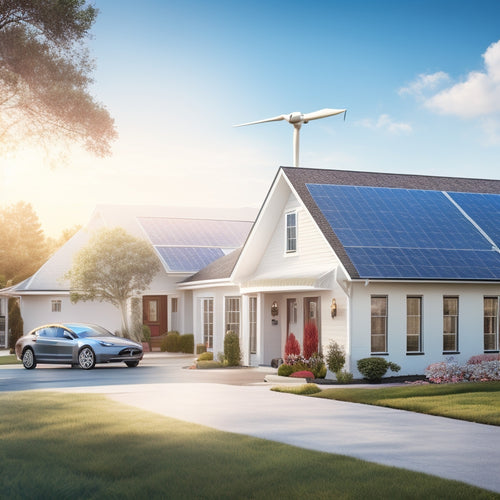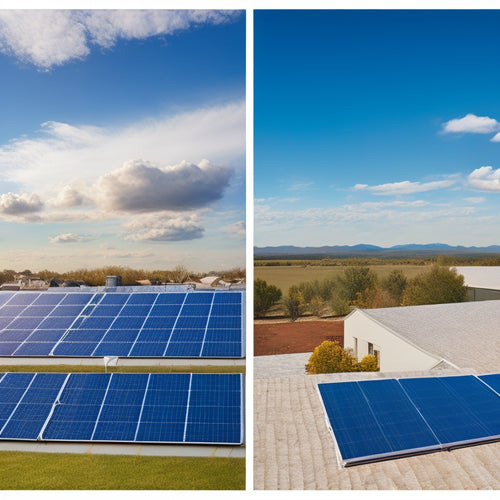
Why Do Residential Solar Panel Systems Cost So Much?
Share
You're likely paying a premium for a residential solar panel system because it's a customized solution that requires high-quality materials, advanced manufacturing, and precise engineering to guarantee maximum energy production and a long-lasting installation. The cost also depends on the complexity of your roof, local building codes, and regulations that impact system design. Additionally, installation labor and overhead, permitting and inspection fees, and warranty and maintenance costs all contribute to the final cost. As you explore your options, you'll discover how these factors come together to create a premium system that meets your specific energy needs.
Key Takeaways
• High-quality materials and equipment, such as efficient solar panels and durable inverters, contribute to the overall cost of the system.
• Customized system design requirements, including roof size and local regulations, impact the final cost of the system.
• Installation labor and overhead expenses, including technician wages and office rent, are a significant factor in determining the total cost.
• Permitting and inspection fees, which vary by location, add to the overall cost of the system.
• Warranty and maintenance costs, including extended warranties and regular inspections, are necessary expenses to ensure system performance.
High-Quality Materials and Equipment
When you invest in a residential solar panel system, high-quality materials and equipment are essential to guarantee maximum energy production and a long-lasting installation.
Premium components, such as high-efficiency solar panels and durable inverters, guarantee that your system operates at peak levels, providing you with the most energy output possible.
Advanced manufacturing techniques also play a pivotal role in the production of these premium components, allowing for precise engineering and quality control. This attention to detail translates to a more reliable and efficient system that requires less maintenance and replacement over time.
Customized System Design Requirements
Your residential solar panel system's design requirements are tailored to your specific energy needs, taking into account factors like your roof's size, orientation, and shading patterns, as well as local building codes and regulations. This customized approach guarantees your system operates at peak energy efficiency, maximizing your return on investment.
Roof complexity can profoundly impact your system's design. For instance, a roof with multiple skylights, vents, or chimneys may require more complex system design and installation, driving up costs. Conversely, a simple, unobstructed roof can accommodate a more straightforward system design, reducing costs.
Your system's energy efficiency is also vital. A well-designed system can generate more power per hour of sunlight, reducing the number of panels needed to meet your energy needs. This, in turn, can lower your upfront costs. By factoring in your roof's unique characteristics and energy efficiency goals, your system designer can create a customized solution that meets your specific needs and budget.
Installation Labor and Overhead
As you consider the total cost of your residential solar panel system, installation labor and overhead expenses play a significant role in determining the final price tag.
These costs aren't insignificant, and they can add up quickly. Labor costs, in particular, are a major factor, as they involve the wages of skilled technicians who install the system. Additionally, the cost of training these technicians is also factored into the overall price.
This is especially true for companies that invest in ongoing training to guarantee their workers are up-to-date on the latest technologies and installation techniques.
Overhead expenses, such as office rent, equipment, and marketing costs, also contribute to the final cost of the system.
Moreover, companies with a unionized workforce may incur higher labor costs due to collective bargaining agreements and benefits. These increased labor costs are then passed on to you, the consumer.
You must understand that these costs are necessary to guarantee a safe, efficient, and high-quality installation. By factoring in these expenses, you can better appreciate the value you're getting for your investment in a residential solar panel system.
Permitting and Inspection Fees
Before installing your residential solar panel system, local authorities require permits and inspections to guarantee compliance with safety codes and regulations, and these permitting and inspection fees add to the overall cost. As a homeowner, you'll need to factor in these expenses when budgeting for your solar panel installation.
The fee structures for permitting and inspection vary depending on your location and local regulations.
Type of permits required: Electrical, building, and zoning permits may be necessary, each with its own fee.
Inspection frequency: The number of inspections needed to verify compliance affects the total cost.
Local government fees: Municipalities charge varying fees for permits, inspections, and plan reviews.
Inspector's time and expertise: The complexity of the installation and the inspector's level of expertise impact the cost.
Additional requirements: Some jurisdictions may require special permits or certifications, adding to the expense.
Understanding the permitting and inspection fees associated with your residential solar panel system will help you plan and budget accordingly.
Warranty and Maintenance Costs
Owning a residential solar panel system comes with warranty and maintenance costs that you'll need to factor into your long-term budget.
These costs can add up quickly, so it's vital to understand what you're getting into.
Typically, solar panel manufacturers offer a warranty that covers defects and repairs for a certain number of years, usually around 25 years.
However, you may need to ponder extended warranties to safeguard beyond that period.
Battery degradation is a significant concern, as it can reduce the overall efficiency of your system over time.
Regular maintenance is vital to prevent this degradation and maintain your system's performance at peak levels.
You'll need to budget for regular inspections, cleaning, and potential repairs to maintain your system's performance.
Additionally, you may need to replace inverters or other components as they reach the end of their lifespan.
Frequently Asked Questions
Are There Any Government Incentives for Switching to Solar Energy?
As you consider switching to solar energy, you'll be relieved to know that you're coincidentally on the cusp of maximizing government incentives - snagging 26% Tax Credits and State Rebates can substantially offset your upfront costs.
Can I Install Solar Panels on My Own to Save Money?
You can consider DIY savings through self-installation, but keep in mind that it requires extensive technical knowledge and compliance with local building codes to guarantee a safe and efficient solar panel system.
How Long Does It Take to Install a Residential Solar Panel System?
"Like a conductor leading an orchestra, you're about to harmonize your solar panel installation. Expect the installation timeline to take around 3-5 days, depending on your system's complexity, with labor costs accounting for around 10-15% of the total cost."
Can Solar Panels Be Used for Heating and Cooling Systems?
You can leverage solar panels to generate thermal energy for space heating, substantially reducing your energy bills; however, you'll need a dedicated system design and specialized equipment to harness the sun's heat efficiently.
Are Solar Panels Recyclable at the End of Their Lifespan?
As you consider the environmental impact, you'll be relieved to know that solar panels are recyclable at the end of their lifespan, reducing solar waste; in fact, 95% of materials can be reused through panel recycling programs.
Related Posts
-

Top Online Stores for Solar Car Accessories
When searching online for solar car accessories, you'll find top retailers like Amazon, REI Co-op, and Best Buy offer...
-

Why Homeowners Are Embracing DIY Energy Independence
By taking control of your energy needs, you're breaking free from the uncertainty of utility bills and embracing a se...
-

Tracking Solar Panels Vs Fixed Panels Cost Savings
When considering solar panel options, you'll want to weigh the cost savings of tracking solar panels versus fixed pan...


